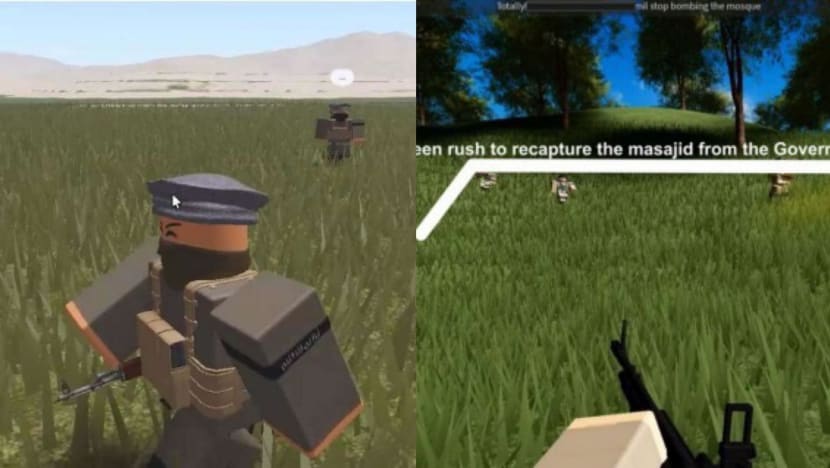Heart of the Matter: Family is 'first line of defence' against radicalisation among youths
Two self-radicalised Singaporean youths, including a 15-year-old boy, were recently issued orders under the Internal Security Act (ISA) for terrorism-related activities. On this episode of the Heart of the Matter podcast, our guests say family members need to be more involved in spotting red flags.

Screenshots of Islamic State propaganda videos created by a 16-year-old using Roblox game footage. (Image: Internal Security Department)
SINGAPORE: When news broke that two Singaporean youths – aged 15 and 16 – were issued orders under the Internal Security Act, Dr Mohammed Bin Ali, co-chairman and counsellor of the Religious Rehabilitation Group (RRG), said what stood out for him was the fact that the family members were unaware of the boys’ radical views or support for armed violence.
Both boys had been exposed to online propaganda spread through podcasts and games, said the Internal Security Department. The 16-year-old boy had joined multiple Islamic State-themed servers on online gaming platform Roblox. The virtual game settings replicated physical Islamic State conflict zones, such as those in Syria and Marawi city in the southern Philippines.
Dr Ali added that “families are the first line of defence against radicalisation. If radicalisation is suspected, parents and even other family members like siblings must realise that they have to intervene because that is actually helping that child.
"If they're not able to advise and give guidance, they must have the guts to report the case to the authorities," he said.
(The) family institution is key. It has always been ignored by the entire ecosystem in fighting online radicalisation. We cannot leave this monitoring work to the authorities.
Dr Ali was speaking to CNA's Heart of the Matter podcast host Steven Chia, together with Dr Omer Ali Saifuddin, head of Military Studies Minor at the Singapore University of Social Sciences, and Nicholas Khoo, co-founder and former chairman of the Singapore Cybersports and Online Gaming Organisation.
Here are some highlights of their conversation:
ON RADICALISATION
Dr Omer: “We're talking about radicalisation as a process that moves you towards accepting ideologies that promote violent extremism. One of the key features of these political ideologies is ... you’ve got to have an enemy, you’ve got to have someone that you demonise and vilify as a source of all societal problems, your problems, everything. That's the central feature here.”
Dr Ali: “Anybody can be radicalised, regardless of their age, gender, political aspiration … And religion is just a tool being used by these individuals.”
HOW RADICALISATION CAN HAPPEN ONLINE
Dr Ali: “In many cases, (young people) want to learn about Islam. But they don’t want to go the mosque to learn from accredited religious teachers. Because to them, it’s a waste of time, they can get it better online."The understanding and teaching of Islam (by foreign preachers) does not suit the context of Singapore. This reality is not known to many young Muslims here.
Dr Omer: “When someone who is young and not able to discern (things) goes online, you basically have a buffet spread of stuff that you can explore. When they lose touch with the real world, they find an alternate family (online), an alternate group of people who see them, and understand their world."
On the community and support youths find online, Nicholas Khoo elaborated:
As they come together (online), they feel that they are meeting like-minded fellows who feel the same way and maybe that creates a more fertile ground for recruitment or radicalisation.
ON WHETHER GAME DEVELOPERS SHOULD DO MORE TO MODERATE CONTENT
Khoo: “The game publishers should do more. But the reality is that they come in all sorts of shapes and sizes. Thousands of games are being launched every month. There’s little to no incentive for (game publishers) to do any form of moderation. They are incentivised by having more people play the game.”
For the full conversation, listen to the episode here.












